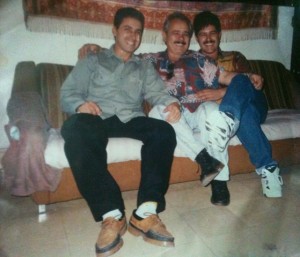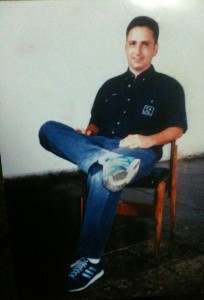
HAVANA, Cuba, July 2013, www.cubanet.org.
In Combinado del Este Prison, in the presence of a lieutenant from the Ministry of the Interior, a common prisoner threatened political prisoner Ernesto Borges with death.
This past June, the common prisoner, who was appointed by the prison authorities as “Head of the Council of Prisoners” despite being a convicted murderer and drug addict with a reputation for violence, told Borges Pérez:
“I’m going to stab you here (pointing to Ernesto’s liver), and leave you to die. They’ll have to bury you in the United States.” The political prisoner described the threat to this reporter during a private visit.
The visiting area is a dining hall. No Cuban independent journalist or foreign news agencies not serving the propaganda interests of the Cuban socialist state, nor the rapporteurs of the Human Rights Council of the UN, have had access to the inside of the Cuban prison system.
After receiving the threat, Pérez Borges warned the inmate that he would make a formal complaint, and would use as his witness Lt. Javier (known as the “re-educator,” because he was in charge of the political indoctrination of common-prisoners), who had been present for the altercation. But the officer replied:
“I won’t be your witness. I wasn’t here.”
Pérez Borges believes that such a response is a green light to a violent convict to assault a political prisoner.
“In general,” he says, “the prison population respects political prisoners unless State Security intervenes.” He adds: “Every month officers meet in an office with the common prisoner they designate as Head (whom everyone else calls “The Enforcer”) and give him precise instructions on how to deal with political ones.”
Death Sentence Commuted
Borges Pérez was sentenced to 30 years in prison by the Military Court of the Cuban Western Army, on January 14, 1999, for the crime of espionage, in case No. 2 of that year. The sentence of death by firing squad was commuted.
He was tried for the crime of having collected the records of 26 “bait agents” of the Cuban secret services, for later disclosure. He was arrested for this action on July 17, 1998.
The prosecutor told the family, at the conclusion of the trial that he would have to serve only one-third of the sentence, ten years, and would then be paroled, because he had been a career soldier with no previous infractions.

But Borges Pérez has not backed down ideologically. He has continued to work in exposing human rights violations against the prison population, and has provided written testimony against the 1996 case against Robert Vesco, in which he served as senior analyst of Department 1 of the General Directorate of Counterintelligence, during the interrogations.
Fifteen years after the events that resulted in his imprisonment, Borges Pérez recalls his reasons for moving from officialdom to the opposition:
“There were a number of factors,” he says: “Perestroika, the corruption I saw within Security of State, the influence peddling, the realization that the only priority of the system is to perpetuate the Castro clan in power, the insensitivity of the State and Party to the misery of the population during the years of the Special Period, in order to maintain political and economic control of the country.”
“Cuban State Security,” he adds, “is a bloated and corrupt apparatus, because it has an excess of resources that have no relation to the non-violent resistance that exists on the island, and a culture of violence shielded by the ideology of the Castro regime. After the end of the Civil War, which ran from 1961 to 1966, and with the arrival of the 1970s, the opposition in Cuba has focused on defending human rights and peacefully struggling against the institutionalized violations by the system. But State Security maintains its structure of repression identical to that used during the Civil War. Being oversized in personnel and resources, its counterintelligence operatives create networks of informants in all segments of society, and thus the Police State is born.”
Hunger Strike
In 2012, Borges Perez went on two hunger strikes. The first lasted 9 days, during which he demanded the right to make phone calls regularly, especially to talk with his daughter who lives abroad, as well as the return of his drugs, prescribed for chronic ailments, including bronchial asthma, and access to specialized medical services. He ended the strike when Lieutenant Colonel Vargas, at that time Chief of Prisons Havana, promised that they would meet his demands.
But the authorities did not comply. Less than a month after he suspended the first hunger strike, he began a second, demanding to be released on parole.
On February 28, 2012, after 18 days of starvation, Cardinal Jaime Ortega came to his cell and promised to discuss his freedom with the General-President of Cuba. “For seven days I valued this promise of the Cardinal and abandoned the strike for 25 days,” he says.
A ministerial committee visited him after a month: “They reviewed my prison record for the first time, and said they had recommended my probation to the court my probation, but it’s been 14 months since that visit.”
“When a political prisoner starts a hunger strike,” said Borges Pérez, “they establish a Command Post, which has to report daily to the top chief of the Interior Ministry. Creating a command post means more gasoline for cars, coffee, cigarettes, special food allotments, vacation homes on the beach, certificates of appreciation, promotion. It is a repressive bureaucratic inertia. They live off that. “
After this latest death threat that he denounced by phone, prison authorities made the decision to change the whole makeup of the floor, keeping only Borges and his cellmate and bringing in a new group of prisoners. Also, Javier the re-educator was transferred.
Sealed Envelopes

But on June 29 he was led, handcuffed, to an office in Combinado del Este where a colonel, who introduced himself as a Vice Director General of Jails and Prisons. The threat was repeated: in the event that democratic changes in Cuba begin, said the colonel, “we are prepared, and you also have to prepare. We have precise instructions in sealed envelopes, on how to deal with you.” (He understood this to mean political prisoners.)
This colonel also said that once again his right to make phone calls would be suspended.
On July 5, an officer with the rank of Major officially told him that his telephone calls would occur, from now on, in an office, and he would only be entitled to a 10 minute call per week, at no pre-set specific time, and monitored by Javier the re-educator.
“By doing this, the prison authorities are violating not only internationally established law on the treatment of prisoners, but are also in breach of the agreement reached after the cessation of my hunger strike in 2012,” says Borges Pérez.
From Cubanet
July 12, 2013
